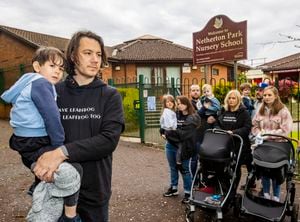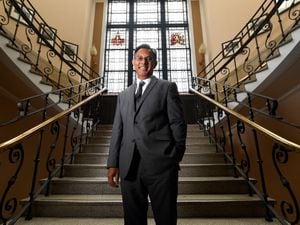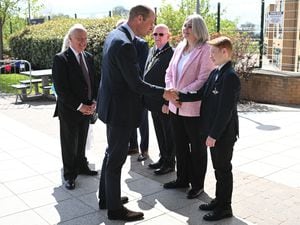Campaign to keep Dudley nursery open after council cuts
A Black Country father has been leading the charge to save a special needs nursery and enable future generations to benefit from it.

Ashley Walton from Kingswinford is one of many parents to have spoken out against the planned closure of Leapfrog, a special educational needs and disability (SEND) facility in Netherton Park Nursery School, which is due to close at the end of the school term in July.
The Leapfrog and Leapfrog Too facilities at the nursery provides education and care for children with complex communication needs, providing a mixture of group sessions and targeted individual work to provide a range of experiences and activities, designed to encourage and facilitate communication, social interaction and co-operation.
Dudley Council has announced plans to decentralise the SEND provision provided at Netherton Park Nursery School and create five Early Years Inclusion Hubs at locations across the borough, with the provision starting in September.
This announcement was met with anger by parents of children using the facility, with Mr Walton among those saying that their children have developed significantly as his son Cole-Treanor has done.
He said that despite offering ideas of how to keep Leapfrog and Leapfrog Too open, Dudley Council had made the decision to get rid of the service due to budgeting.
He said removing the service would cause issues for people travelling to the new hubs and spoke about what made Leapfrog special.
He said: "A lot of it comes down to budgeting and down to the travel cost, because it has been over budgeted for the last few years by around £220,000, so they're trying to reduce that cost.
"However, the new hub settings will only have around eight children per hub, so we're only gaining around four extra spaces, but if a child was in Halesowen, for example, and there was no space, they'd still have to travel and apply for the taxi fund, so there's still a cost.
"Leapfrog is special because of the staff as they really help you and support you and give you guidance as we are all struggling with early years children when we notice things and they are just really good at communication and showing us the ways forward."
Mr Walton said a petition had gathered more than 800 signatures so far, as well as getting support from the Labour group leader at Dudley Council, Councillor Qadar Zada and Upper Gornal and Woodsetton councillor Adrian Hughes.
He said the parents group wanted Dudley Council to pause the changes, consult with parents and agree the best provision for their children and guarantee enough capacity to support local children.
He said that the ultimate aim was to keep this facility in place for future generations to use, having seen the benefits for his son Cole-Treanor.
He said: "My son will be finishing his term this year and we're trying to help and support other parents for the future because the place has been so good for us and other parents since it opened.
"We've got 800 signatures on this petition and our Facebook posts are getting thousands of views, so it's positive stuff and we just want to keep this place going."
To find out more and to sign the petition, go to https://shorturl.at/nqJQ1
Sal Thirlway, service director of education, SEND and family solutions at Dudley Council, said: “Our new approach in creating five early year hubs across the borough will be supported by existing council budgets.
"This new way of working has not been developed as a result of any savings requirement but to address the needs of children in our borough.”
“The most appropriate setting for the early years hubs will be selected over the coming months, through a robust and detailed tender process, which has now launched and we welcome bids from all providers, including Leapfrog.
“By reducing the need for children to travel to an early years setting outside of their community, we not only reduce stress for parents, but we also give the children a chance to integrate in their local area.
“This also further strengthens our work to keep as many children as possible in mainstream education as they prepare for adulthood, which we know benefits them and their community in the long run.”





